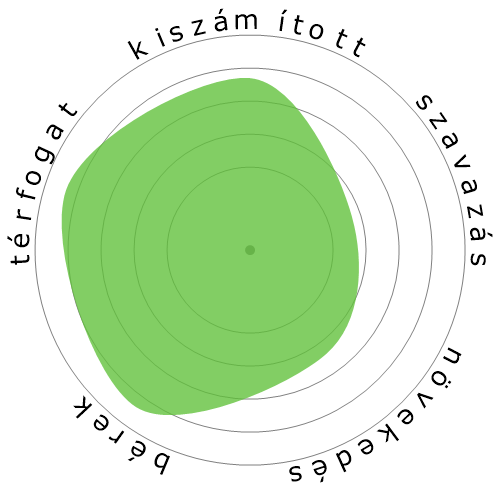Ügyvédek
Hová szeretne legközelebb menni?
Vagy fedezze fel ezt a szakmát részletesebben...


Mit mutat ez a hópehely?
Mi ez?
Négy tényező alapján értékeljük a munkákat. Ezek a következők:
- Az automatizálás esélye
- A munkahelyek növekedése
- Bérek
- Rendelkezésre álló pozíciók száma
Ezeket az alapvető szempontokat érdemes szem előtt tartani munkakeresés során.
Az emberek ezt is megtekintették
Számított automatizálási kockázat
Alacsony kockázat (21-40%): Ennél a szintnél a munkák csak korlátozottan vannak kitéve az automatizálás veszélyének, mivel ezek a pozíciók technikai és emberközpontú készségek kombinációját igénylik.
További információ arról, hogy mi ez a pontszám, és hogyan számítják ki, elérhető itt.
Felhasználói szavazás
Látogatóink szavaztak, és nem biztosak abban, hogy ez a foglalkozás automatizálásra kerül-e. Azonban a munkavállalók talán megnyugvást találhatnak abban az automatizált kockázati szintben, amit létrehoztunk, ami 23% esélyt mutat az automatizációra.
Mit gondol, milyen kockázatai vannak az automatizációnak?
Milyen valószínűséggel fogják Ügyvédek robotok vagy mesterséges intelligencia helyettesíteni a következő 20 évben?
Érzelem
Az alábbi grafikon ott jelenik meg, ahol elegendő szavazat áll rendelkezésre ahhoz, hogy értelmes adatokat lehessen előállítani. Az idő múlásával mutatja a felhasználói szavazások eredményeit, egyértelműen jelezve a hangulati trendeket.
Érzelem idővel (negyedévente)
Érzelem az időben (évente)
Növekedés
A(z) 'Lawyers' munkahelyi nyitások száma várhatóan 5,2%-kal nő 2033-ra.
Teljes foglalkoztatottság és becsült állásnyitások
A frissített előrejelzések 09-2025 időpontban esedékesek..
Bérek
A(z) 2023-ban a 'Lawyers' éves középfizetése 145 760 $ volt, vagyis 70 $ óránként.
'Lawyers' magasabb összeget kaptak, mint az országos mediánbér, ami 48 060 $-n állt.
Bérek az idők folyamán
Térfogat
2023 időpontjában 731 340 ember dolgozott 'Lawyers' munkakörben az Egyesült Államokban.
Ez körülbelül a 0,48% -át képviseli az országban foglalkoztatott munkaerőnek.
Másképp fogalmazva, körülbelül minden 207. ember 'Lawyers'-ként dolgozik.
Munkaköri leírás
Képviseljük az ügyfeleket bűnügyi és polgári peres eljárásokban, valamint más jogi eljárásokban, készítünk jogi dokumentumokat, vagy kezeljük és tanácsot adunk az ügyfeleknek jogi tranzakciókban. Lehet, hogy egyetlen területre specializálódnak, vagy széles körben gyakorolják a jog számos területét.
SOC Code: 23-1011.00
Hozzászólások (233)
They'll do less errors, and don't require sleep. No more receptionist that is away. Longer opening hours.
Why do you say robots have no empathy, you fillthy racist? They have it. Robots would probably beat you up.
Not that I'd expect someone who doesn't even know the definition of 'racist' and just flings the word around however would know what empathy is...
And besides, you never even addressed what they said. They didn't even bring up empathy, as their point was about people not wanting a robot to defend them. You've brought up a completely nonsensical rebuttal to an argument that doesn't exist.
These are the tasks that robots won't be able to fulfill for at least a decade from now.
These are the tasks that robots won't be able to fulfill for at least a decade from now.
Válasz a hozzászólásra